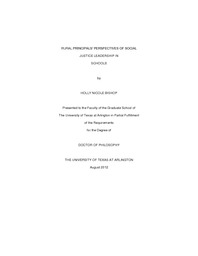
ATTENTION: The works hosted here are being migrated to a new repository that will consolidate resources, improve discoverability, and better show UTA's research impact on the global community. We will update authors as the migration progresses. Please see MavMatrix for more information.
Show simple item record
| dc.contributor.author | Bishop, Holly Nicole | en_US |
| dc.date.accessioned | 2013-03-20T19:12:17Z | |
| dc.date.available | 2013-03-20T19:12:17Z | |
| dc.date.issued | 2013-03-20 | |
| dc.date.submitted | January 2012 | en_US |
| dc.identifier.other | DISS-11789 | en_US |
| dc.identifier.uri | http://hdl.handle.net/10106/11592 | |
| dc.description.abstract | This qualitative study explores how principals who are leaders for social justice in rural high schools perceive student diversity, specifically lesbian, gay, bisexual, transgender, or questioning (LGBTQ) students, and if, how, and why they support all students through the establishment of a socially-just school climate. Additionally, the study investigates how the context of the schools, specifically rural communities with conservative values, affects principals' perceptions and implementation of a positive climate for all students. This study offers modifications to Theoharis' (2007, 2009) social justice leadership theory and extends Theoharis' (2007) model of resistance, offering insight into how rural school communities reflect a unique context for examining equity constraints. The study's findings suggest that these leaders, despite their social justice orientations, upheld community normative values and did not perceive bias against LGBTQ students. | en_US |
| dc.description.sponsorship | McCellan, Rhonda | en_US |
| dc.language.iso | en | en_US |
| dc.publisher | Education | en_US |
| dc.title | Rural Principals' Perspectives Of Social Justice Leadership In Schools | en_US |
| dc.type | Ph.D. | en_US |
| dc.contributor.committeeChair | McClellan, Rhonda | en_US |
| dc.degree.department | Education | en_US |
| dc.degree.discipline | Education | en_US |
| dc.degree.grantor | University of Texas at Arlington | en_US |
| dc.degree.level | doctoral | en_US |
| dc.degree.name | Ph.D. | en_US |
Files in this item
- Name:
- Bishop_uta_2502D_11789.pdf
- Size:
- 1.707Mb
- Format:
- PDF
This item appears in the following Collection(s)
Show simple item record


